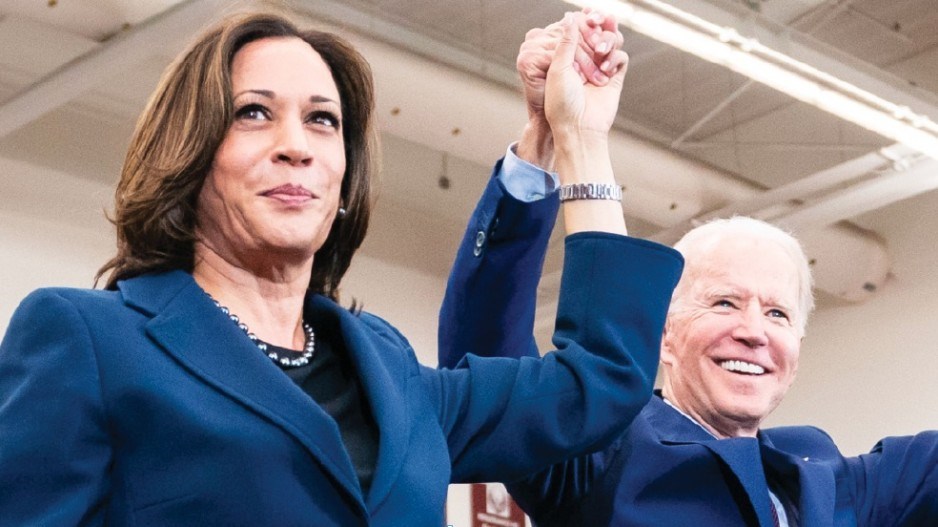As former U.S. vice-president Joe Biden strengthens his lead in the race for the presidency amid ongoing vote counting, a clearer picture is emerging for what Canadians can expect for their own economy.
By early Friday (November 6), Biden appeared to be pulling away in battleground states Pennsylvania and Georgia — wins that would deliver him a victory in the Americans’ electoral college.
For Canada, a Biden presidency would mean a shift in a number of policies that would have immediate impacts.
While the Trump administration has put the squeeze on immigration — including top-level talent sought by corporate America — over the past four years, Biden is expected to loosen restrictions, according to Dick Burke, president and CEO of Chicago-based immigration services firm Envoy Global Inc.
He said Canada has benefitted considerably from U.S. President Donald Trump’s immigration policies — policies that have seen everything from children separated from their parents at the southern border to changes to the H-1B visa program making it more difficult for U.S. companies to bring in skilled immigrants.
Ottawa revealed in late October plans to bring in 1.2 million immigrants over the next three years with an eye on addressing labour shortages and boosting the economy amid the pandemic.
Those targets might be more difficult to reach if the U.S. pursues more progressive immigration policies that attract global talent.
“Canada's policies are smarter, more hospitable, more attractive than America’s and that advantage is not going to be completely lost, regardless of who assumes the presidency in the United States,” Burke told BIV.
Ken Peacock, chief economist at the Business Council of B.C., said a more co-ordinated effort to tackle the COVID-19 crisis under Biden would be a boon for both the Canadian and American economies, and would likely lead to travel restrictions loosening sooner than they would under Trump.
"We're probably more likely to see some sort of major stimulus package of a Democratic regime or a Democratic president," he told BIV, adding a Republican-controlled Senate would likely limit the size of the stimulus.
Peacock said a quicker recovery for the U.S. economy would also pay dividends for Canada.
A Biden presidency could also have immediate impacts on Canada’s energy sector with the Democrat pledging to reverse a permit for the Keystone XL pipeline previously granted by Trump.
The on-again-off-again project would see a pipeline running from Alberta south to refineries in the U.S.
“To me that suggests that there will probably be tighter regulations in the whole oil and gas space. And to the extent that a new president brings in tighter regulations and a more comprehensive regulatory environment, that will level the playing field with Canada,” Peacock said.
He said the most likely outcome is that Keystone will ultimately be killed, proving to be a strike against Alberta’s recovering economy.
“It’s not clear if the president can revoke the permit and order the pipeline dismantled. It’s probably too late…. Biden does appear to want environmentalists on his side, but my view of it is that it will be disappointing for [Canadian energy] while not being an attack on Canada,” Christopher Sands, a senior research professor at John Hopkins University in Maryland and director of the Canada Institute at the Woodrow Wilson International Center for Scholars, told BIV.
He added Canada also should not expect surprise tariffs, like the ones imposed multiple times by the Trump administration on its northern neighbour, under Biden.
BMO researchers also said Canadians should expect more stability in trade relations moving forward.
“On the multilateral front, a much more constructive international backdrop would be expected under Biden, after the Trump Administration almost paralyzed the WTO [World Trade Organization],” economists at the bank said in a research note.
“Biden would be more likely to enlist the support of other major economies in a unified effort to challenge some of China’s trade and industrial policies.”
Biden has floated the idea of joining Canada in the Comprehensive and Progressive Agreement for Trans-Pacific Partnership (CPTPP).
The trade agreement was initially spearheaded by the U.S. as a means to push back against China’s economic influence in the Asia-Pacific region.
Trump railed against it during his 2016 presidential election campaign and the U.S. ultimately did not join the CPTPP.
Canada should also expect a “dramatic and immediate” reset in relations with the U.S. should Biden become president, according to University of British Columbia political science professor Paul Quirk.
“A Biden presidency would eliminate the extreme hostility toward trade that has inconsistently driven Trump’s policies,” said Quirk, the Phil Lind chairman in U.S. politics and representation at the university.
“That kind of severe anti-Canadian policy would never occur [with Biden].”
Meanwhile, BMO economists point out corporate tax rates are unlikely to inch upwards in Canada if Biden secures the presidency.
The Republicans look poised to retain control of the Senate, meaning Biden’s promise of raising corporate tax rates seven percentage points to 28% is unlikely to come to fruition.
“It’s safe to say that the absence of tax hikes in our closest competitor will leave Ottawa with little room to manoeuvre,” BMO said in its post-election night report.
—With a file from Chuck Chiang




